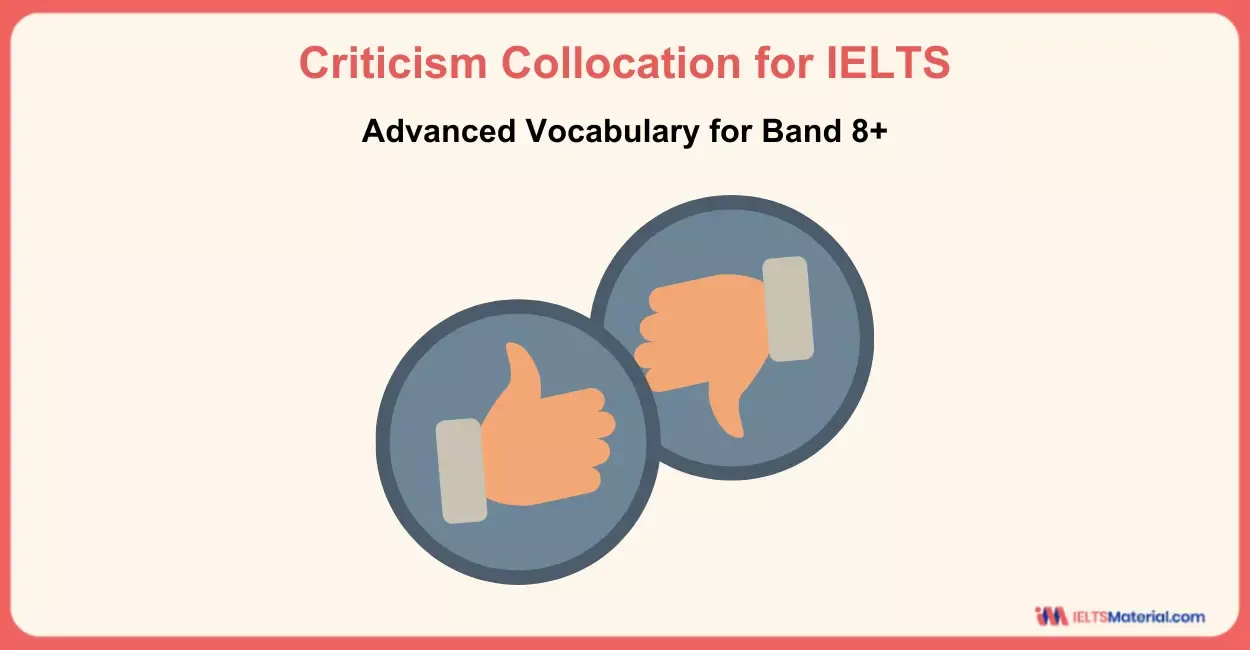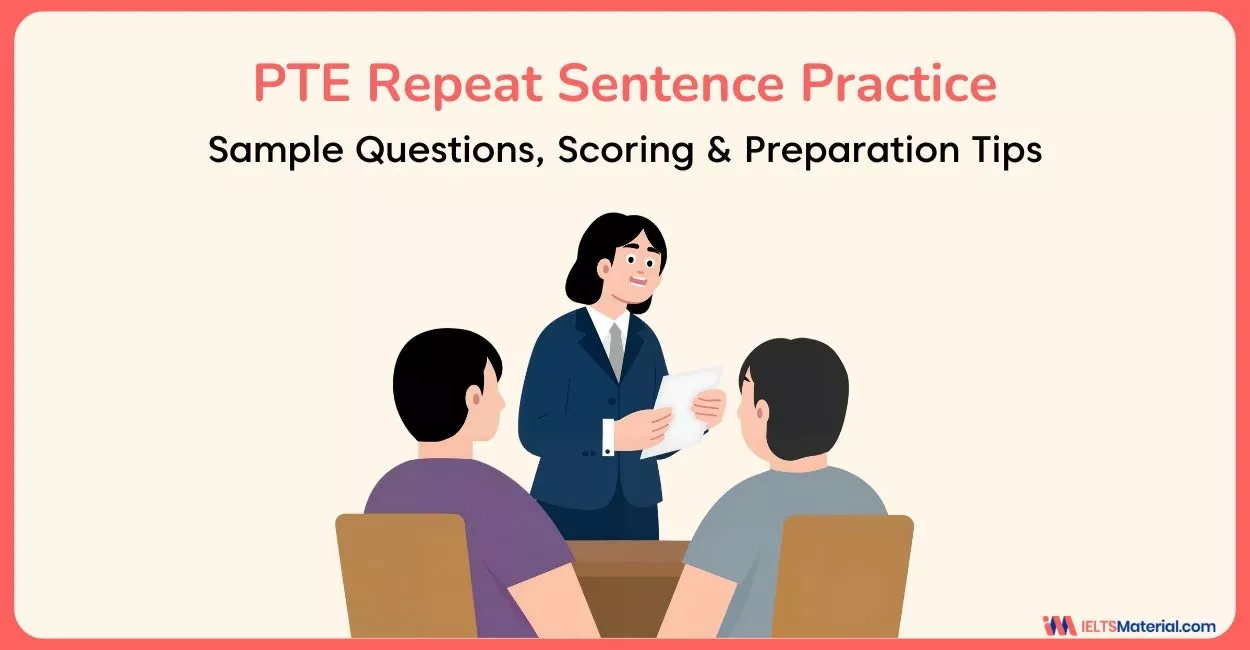Criticism Collocation for IELTS - Advanced Vocabulary for Band 8+
7 min read
Updated On
-
Copy link
Want to boost your IELTS score to a band 8+? Learn how to use advanced vocabulary with ‘Criticism Collocation for IELTS’ and discover common mistakes to avoid as well as its appropriate usage with verbs, prepositions, and adjectives.
Table of Contents

Limited-Time Offer : Access a FREE 10-Day IELTS Study Plan!
By choosing precise and advanced academic vocabulary, such as Criticism Collocation for IELTS, you can demonstrate a higher lexical flexibility in your answers. As you get familiar with these collocations, you will be able to enhance the content of your answers and bring greater fluency in your speech. Therefore, to get a score band 8+ in the IELTS Exam, you must familiarize yourself with the collocations' meanings and examples of their application in IELTS Speaking and Writing tasks.
Connect with our IELTS Trainers to crack your IELTS exam in no time! FREE Demo.
How to Use Criticism Collocations for IELTS?
While preparing for the IELTS Speaking & Writing sections, you can use these collocations in your responses to showcase a higher level of proficiency. However, it is also important that you know how to fit them in different sentences seamlessly. To get a band 8+ in the parameter of lexical resources, you need to also focus on your grammatical range and accuracy. Let’s learn the types and how to use the criticism collocations for IELTS.
1. Verb + Criticism
You can pair criticism with certain verbs to show how the criticism is given, addressed, or even received. The table below would depict the type with an example, and a tip where to use it to enhance your writing and speaking answers.
|
Collocation |
Strategy |
Example |
|
Face criticism |
Use it in Writing Task 2 when discussing public issues. |
The politicians usually face criticism for their policies. |
|
Draw criticism |
Incorporate it for essays on policies or laws. |
The new law passed by the government drew criticism from environmentalists. |
|
Answer or Respond to criticism |
This can be useful in Speaking for describing the process of dealing with feedback. |
The management responded to criticism with a promise of total transparency. |
2. Preposition + Criticism
When you use the term ‘criticism’ with a preposition, you might also change the meaning of the word itself. By using them correctly, you can show a higher level of lexical precision. Let’s check out the table below to get familiar with such collocations and also learn how to use it in your speaking and writing answers.
|
Collocation |
Strategy |
Example |
|
Criticism of |
This is a very common collocation and you can use it in both Speaking & Writing. |
There has been widespread criticism of the new policy. |
|
Criticism from |
This would emphasize the source of critique. |
The proposal received harsh criticism from experts. |
|
Criticism about |
This is suitable for discussing any issues or mistakes. |
He faced criticism about his handling of the project. |
3. Getting a Lot of Criticism
The level of criticism that someone receives can vary which can be either frequent or intense. To emphasize on it, you can use certain collocations with criticism so that you can incorporate based on the context of the sentences. The following table includes such collocations which can be used to focus on the level of criticism.
|
Collocation |
Strategy |
Example |
|
Face heavy criticism |
This would help show the intensity of critique. |
The actor faced heavy criticism after the controversial film. |
|
Come under criticism |
This collocation is formal so this is ideal for writing task 2 essays |
The government came under criticism for failing to act. |
|
Draw widespread criticism |
This will add depth to your speaking section when discussing social issues. |
The company’s decision drew widespread criticism online. |
4. Common Adjective + Criticism Collocations
Using adjectives can help you explain the type, intensity, or tone of criticism. With this, your answers would sound fluent, precise, and natural while adding nuance to your opinion in the Speaking section. The table below has a list of three such criticism collocations with common adjectives.
|
Collocation |
Strategy |
Example |
|
Harsh criticism |
This shows strong negative feedback. |
For failing to update the curriculum, the teacher was subjected to harsh criticism. |
|
Fierce criticism |
As you use this, it will help to highligh the strongest view. |
The proposal received fierce criticism from environmentalists. |
|
Public criticism |
This would help emphasize on the perception of the critique. |
After the recent scandal, the minister was criticized in public. |
Check out the Top 10 IELTS Grammar Books and get a chance to score a band 8+.
Common Mistakes to Avoid in “Criticism” Collocation for IELTS
The correct use of the word 'criticism' along with its respective collocation would give more natural and precision to both your Speaking and IELTS Writing answers. However, there are certain common errors and minor mistakes which can reduce the answer’s clarity and make you appear less proficient. Below are some of the common mistakes which you need to be aware of so that you can avoid them while using criticism collocation for IELTS.
-
Mixing verbs together
To explain someone getting criticism, you need to use interchangeable verbs such as face, receive, draw, come under, respond to. Using such strong verbs would add to your language strength.
|
Incorrect : The government got criticism for the new law. Correct : The government faced criticism for the new law. |
-
Using wrong prepositions
Using wrong use of prepositions like on, for, can make a sentence awkward. Therefore, always make sure if the chosen preposition fits the collocation naturally.
|
Incorrect : The proposal received criticism on experts. Correct : The proposal received criticism from experts. |
-
Using ‘criticism’ too many times
By repeatedly using the word “criticism,” your writing or speaking answers would sound redundant.
|
Incorrect : The policy faced criticism. The government faced criticism again. People criticized the policy. Correct : The policy drew criticism from experts, and the government had to respond carefully. |
-
Misplaced adjective
Remember that adjectives are always placed before the noun. Therefore, you need to also practice the main topics from IELTS Grammar.
|
Incorrect : The CEO’s decision drew criticism harsh. Correct : The CEO’s decision drew harsh criticism. |
-
Informal or Formal Use Confusions
The Writing task requires you to use formal vocabulary while in Speaking, casual expressions are acceptable. But for academic essays, such casual language is hardly fitting and you must use a formal language.
|
Incorrect : He got a lot of criticism from his friends.” (formal essay) Correct : He faced heavy criticism from his peers. |
Prepare yourself with An Exclusive Grammar Workbook: Guide to All Grammatical Woes!
Exercise on Criticism Collocation for IELTS
Once you have grasped the knowledge on criticism collocation for IELTS, you must indulge yourself with the following exercises to observe their usage in real-life environments. These will help you understand how to use them naturally and note down the areas of improvement. Now, it is time to check out the exercises.
EXERCISE 1. Use the correct form of these verbs where you would use the collocation verb + criticism.
|
aim |
resent |
|
take |
Single out for |
1 I’m very angry at the report on my teaching. I deeply ______________ the inspector’s criticism.
2 The manager is very sensitive. He just can’t ______________ criticism. I don’t know how he got the job.
3 The whole team was responsible for our poor performance. I don’t understand why I was______________ criticism by the manager.
4 Criticism has been levelled at the government for the increase in hospital waiting lists. Most of the criticism has been______________ at the Minister.
EXERCISE 2. Use these expressions in the sentences where you would use the collocation preposition + criticism.
|
barrage of criticism |
open to criticism |
note of criticism |
|
in response to criticism |
sensitive to criticism |
target for criticism |
1 If you stick to your extreme political views, don’t complain if you become a ______________ .
2 The company has changed its working practices ______________ by government inspectors.
3 Choose your words carefully. She is very ______________ .
4 People in public life must be ______________ . If they’re not, they simply won’t survive.
5 Do I detect a ______________ ? I would have thought you were the last person to dare to criticise me!
6 After the singer’s appalling behaviour at the awards ceremony, she faced a ___________ in the national press.
EXERCISE 3. Underline the verbs and phrasal verbs in the sentences below which indicates getting a lot of criticism:
1 The French government has received strong criticism for continuing to test nuclear weapons in the Pacific.
2 The police chief has come in for harsh criticism over his handling of the riots.
3 The government’s economic policies have attracted a lot of criticism recently.
4 The controversial film ‘Hooligans’ has run into severe criticism for its use of strong language.
5 The new regulations on immigration have come under considerable criticism in the press.
6 The government is currently facing fierce criticism over its failure to reduce taxes.
EXERCISE 4. Complete the sentences below with the following common adjective collocations:
|
constructive |
growing |
|
mild |
unjustified |
1 I’m willing to accept your criticism of the way you were treated by Reception, but I think your criticism of ‘the whole staff of the hotel’ is wholly ______________ .
2 My tutor didn’t offer any ______________ criticism of my poem. He just said he didn’t like it. I thought he would at least have given me some advice on how to improve it.
3 The government is coming under ______________ criticism for its failure to send food to the starving people of West Africa. More and more people are demanding action.
4 Make sure you only say positive things about her work. She can’t accept even ______________ criticism of her paintings. She thinks she’s the new Van Gogh!
Answers for the Exercise on Criticism Collocation for IELTS
Awesome job! Now it’s time to check whether you have applied the criticism collocations appropriately. This will help you get a feel for how they naturally fit into context and ultimately improve your IELTS Band Score.
Exercise 1:
|
1. resent |
2. take |
3. singled out for |
4. aimed |
Exercise 2:
|
1. target for criticism |
2. in response to criticism |
3. sensitive to criticism |
|
4. open to criticism |
5. note of criticism |
6. barrage of criticism |
Exercise 3:
|
1. received |
2. come in for |
3. attracted |
|
4. run into |
5. come under |
6. facing |
The five adjectives are: strong, harsh, severe, considerable, and fierce.
Exercise 4:
|
1. unjustified |
2. constructive |
3. growing |
4. mild |
Enroll into our Free IELTS Webinar and learn more about techniques to improve your grammar for IELTS.
Criticism collocations for IELTS can give you a competitive advantage in the parameters of IELTS Vocabulary. These collocations would let you express opinion, evaluation, and judgment in an academic manner. Remember that you will be assessed based on your knowledge in terms of using your vocabulary for flexibility and accuracy. Therefore, you need to learn using such collocations appropriately while avoiding repetition to showcase advanced linguistic capabilities for getting a band 8+.
Also Check:

Start Preparing for IELTS: Get Your 10-Day Study Plan Today!
Explore other IELTS Articles

Haniya Yashfeen

Kasturika Samanta
Recent Articles

Nitika Gupt

Nehasri Ravishenbagam

Nehasri Ravishenbagam







Post your Comments